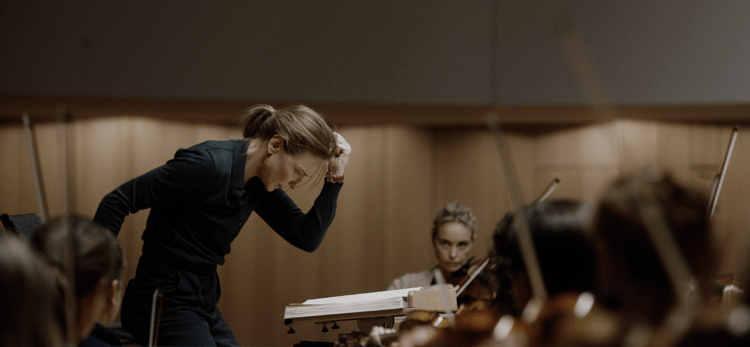
“It’s all about time.”
That’s what Lydia Tár (Cate Blanchett) answers when asked about the value of the conductor in the opening scene of writer-director Todd Field’s newest film, “Tár.”
It’s all about time.
But she goes on. It’s more than being a human metronome, keeping pace and tempo at a steady rate. It’s about controlling time. Managing it. Bending it to her whims. For those minutes when she is on the podium, when she is at home on the podium, she has total and complete control over time. The orchestra before her and the audience behind her are in her dominion. Their heartbeats are at her mercy as she chooses when to let the next note fall. And for “Tár’s” two hours and forty-minute runtime, we are subsumed into that audience. We are held captive by Lydia, swayed by her hands moving up and down, hypnotized by her tempo, entranced by her motions. We are under her control.
That’s part of what makes “Tár” such a complicated joy to watch. We are aware that we are under her sway, and we are charmed by her charisma. At the same time, we are also the only ones privy to how cruel and vindictive Lydia is. We see her for all her flaws and her machinations, but we are unable to step in. Like the audience watching the orchestra, we are helpless, unable to burst onto the stage to seize the reins from the conductor to steer the symphony away from tragedy. That tension is what makes “Tár” feel like a much shorter film than it actually is: each scene is pointed and directed, careening us towards disaster.
All of this is driven by Todd Field’s electrifying dialogue. Some scenes in Tár go on for ten minutes at a time, consisting entirely of talking heads. But the language is so erudite and sharp that you are enraptured by their words. Even people without any knowledge of classical music will find themselves caught up in Field’s words. Scenes soar by, despite nothing ostensibly ‘happening.’ The best scenes of “Tár” feel like they come from a play, where the only thing the company can depend on is the quality and layering of the words. Many of the characters in “Tár” rarely say how they actually feel, least of all Tár herself. They are all lying to each other, preening, posturing, and trying to keep their soft underbellies hidden. In Tár’s world, only the weak say what they actually want. The strong simply take action to seize their desires.
The layered dialogue only lands because of the film’s stellar cast, each connected to Lydia Tár’s work as the conductor of the Berlin Philharmonic. Noémie Merlant shines as Francesca, an aspiring conductor who is currently, much to her chagrin, Tár’s doting assistant. Mark Strong is fantastic as Elliot Kaplan, an obsequious wealthy man who both funds Tár’s endeavors and desires her talent. Sophie Kauer steals the show as Olga, a young Russian cellist who is perpetually tardy, and the only person who seems immune to Tár’s designs. And Nina Hoss deserves special recognition as Sharon Goodnow, Tár’s wife and also Tár’s most esteemed colleague, first violin at the Berlin Philharmonic. Sharon is the film’s only character who has to manage Tár both in the household and in the concert hall. Hoss fills the role masterfully, tuning up and tuning down aspects of her character depending on her audience, whether it is the entirety of the Berlin Philharmonic or their young daughter, Petra.
And this is still saying nothing of the inimitable Cate Blanchett, Lydia Tár herself. The movie only works because Blanchett fully inhabits Tár as a living, breathing person. Never does Tár feel like a pastiche or a cliche of a manipulator. It’s for that reason that despite all her vindictiveness and callousness, we don’t get tired of Tár. We hate what she has done, is doing, will do to the people around her. But we cannot bring ourselves to look away. We understand her, and we revile her all at once.
Nothing captures Blanchett’s hypnotic performance better than the film’s third scene, where Tár teaches a class at Juilliard. In the scene, a student tells Tár that he has no interest in Bach whose identity is so far from his own. Tár takes issue with this, seeing herself as beyond her own identity as a white lesbian cis-woman. She resents the battlefield of identity politics and in one long take, proceeds to annihilate the student’s confidence, alternating between playful mocking to outright derision. It’s an incredibly uncomfortable scene to watch, and not just because of Tár’s viciousness. It’s difficult to watch because in many ways, Tár is right. But so is the student. Tár cannot concede any ground to the student, because that would be a loss of control. Rather than keeping the conversation abstract and conceptual, she digs in, attacking the student for his own identity and questioning his commitment to the cause of music. And like any good piece of music, Blanchett plays this scene with dynamism and flow. Her tempo quickens and slows, her voice rises and falls, she switches from a low timbre to a higher pitch. Blanchett plays Tár like her own voice and body is an instrument.
It’s in these long scenes that Blanchett really shines, when she can show us Tár moving through the world, the gears turning behind her eyes, as she plots her next move. It’s for this same reason that the film’s last ten minutes don’t play as well as the rest of its runtime. In this section, the film’s tempo changes abruptly. Gone are the long scenes of dialogue. Instead, we get quick snapshots of Tár in an unnamed country, one that we are given very little detail on unlike the luxurious time we spent in Berlin. It leads to an incredible moment of symmetry as Tár reckons with her past sins. But it also creates many unwelcome questions, such as why the country is unnamed, even though its location may be obvious to some, or why the film portrays it as crass, as almost unworthy of Tár’s talents. I would not say that this change of setting is problematic; moreso that the seemingly off-kilter artistic decisions of this extraneous section create unwanted questions that distract from the film’s otherwise tightly written narrative.
We often equate genius with cruelty. That to achieve such heights, to be the best at what you do, you must step on other people to get there. That you have to be merciless, manipulative, and without remorse to ascend. That we, as a society, must make some moral exceptions for brilliance. “Tár” makes no such claims about its protagonist. Lydia Tár is phenomenal, a wonder of her profession, and she is completely awful to the people around her. The two things are not connected. Her gift is not a curse. She is her own curse. And by the film’s ending, that is all she has. All she has is herself. Because for all her time on the podium, all her time conducting and waving her baton, Tár never realizes: she can stop time, she can start time, but she can never make it go backwards.
Myle Yan Tay (MFAW 2023) cares a lot about movies and comic books. One day, maybe they will care about him. Find more of his writing at www.myleyantay.com.







